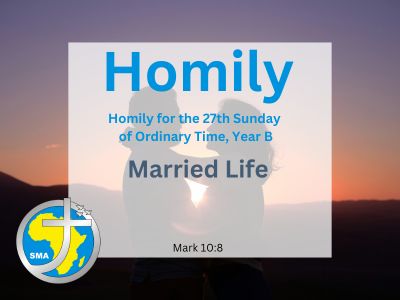Readings: Genesis 2:18-24; Hebrews 2:9-11; Mark 10:2-16
Theme: Married Love
Our readings today invite us to reflect on the theme of married love. The first reading from the book of Genesis expresses in beautiful language God’s vision of marriage. Speaking about the ‘suitable’ companion God gave him, Adam joyfully exclaims: ‘This one at last is bone of my bones and flesh of my flesh! She shall be called Woman, because she was taken from Man’ (Gen 2:23). The author of Genesis then declares that this divinely fashioned companionship lies at the heart of marriage and of married love: ‘Therefore a man leaves his father and his mother and clings to his wife, and they become one flesh’ (Gen 2: 24).
As our first reading illustrates, the love between a man and woman is something wonderful and mysterious. It is a love that often begins with the what we usually refer to as ‘falling in love’ – the kind of experience we imagine that Adam had when he first set eyes on Eve! It is a thrilling but temporary experience. In his famous novel, Captain Corelli’s Mandolin, Louis de Bernières describes this experience as a ‘temporary madness’ that ‘erupts like volcanoes and then subsides.’ And when it does subside, then comes the time to decide. Will I commit myself to this person for the rest of my life? Ultimately, married love is about making a decision and sticking with it. Like all true love, married love is about commitment. The love that leads two persons to become one involves the will as well as the heart. To quote Bernières again: ‘You have to work out whether your roots were so entwined together that it inconceivable that you should ever part. Because this is what love is. Love is not breathlessness; it is not excitement; it is not the promulgation of promises of eternal passion; that is just being in love which any fool can do. Love itself is what is left over when being in love has burned away and this is both an art and a fortunate accident’.
In our gospel reading from Mark, Jesus repeats this teaching of Genesis in response to a question from the Pharisees about divorce, and adds: ‘What God has united, man must not divide’ (Mk 10: 9). At the time of Jesus, Jewish law allowed divorce, but only the man could initiate divorce proceedings. The woman could not. And when a man divorced his wife she was left without property or security and could not remarry. There was disagreement also regarding the grounds for divorce. Some rabbis insisted on granting divorce only for very serious reasons, while others argued that even trivial reasons could suffice. Given this context, it is not surprising that Jesus refuses to take sides in the debate. Instead he reminds his audience that God intended the union of man and woman to be permanent and he declares this as the norm. In this teaching Jesus also affirms the fundamental equality of men and women with respect to the privileges and responsibilities of marriage.
It is far from easy to live the Christian ideal of marriage as a life-long union. Human experience shows that communication sometimes breaks down, relationships fester, and marriages collapse, even with the best will in the world. Over the past fifty years there has been a worrying world-wide rise in the number of divorce cases. However, the statistics on divorce do not tell the full story. Many couples opt for a kind of ‘virtual’ divorce. While they remain a couple nominally, they live completely separate lives and leave one another free to embark on new liaisons. In Ireland, where the formal divorce rate is the lowest in Europe, this kind of ‘divorce’ seems to be on the rise.
While the Church continues to uphold the teaching of Christ on the permanence of the marriage union, it also puts in place a solid network of supports for those striving to live this ideal. Marriages don’t happen, they are the fruit of a lot of hard work. Marriages often run into trouble simply because there is no one around to give support and counsel when a marriage runs into a rough patch. The importance of this support came home to me some years ago when I celebrated the golden jubilee of a first cousin’s wedding. My cousin spoke of a major turning point early on in her marriage when her husband lost his job, and she and her husband were struggling to make ends meet, with four young children to care for. She stressed that it was the encouragement and practical support of her family, relatives, friends, and the local community, that helped them through the hard times to remain faithful to their commitment for the past fifty years. There is a lovely image from nature that illustrates the importance of this kind of communal support. On the Rocky Mountains in California, huge trees grow in soil too thin and rocky for them to put down deep roots. Instead they spread their roots out wide and join up with the roots of other trees. This gives them the strength to grow tall and sturdy despite the ravages of wind and rain.
So we pray: ‘Lord bless the commitment of married couples, and help them to find the support they need to remain ever faithful to one another. Amen’.
Listen to an audio of the Homily

